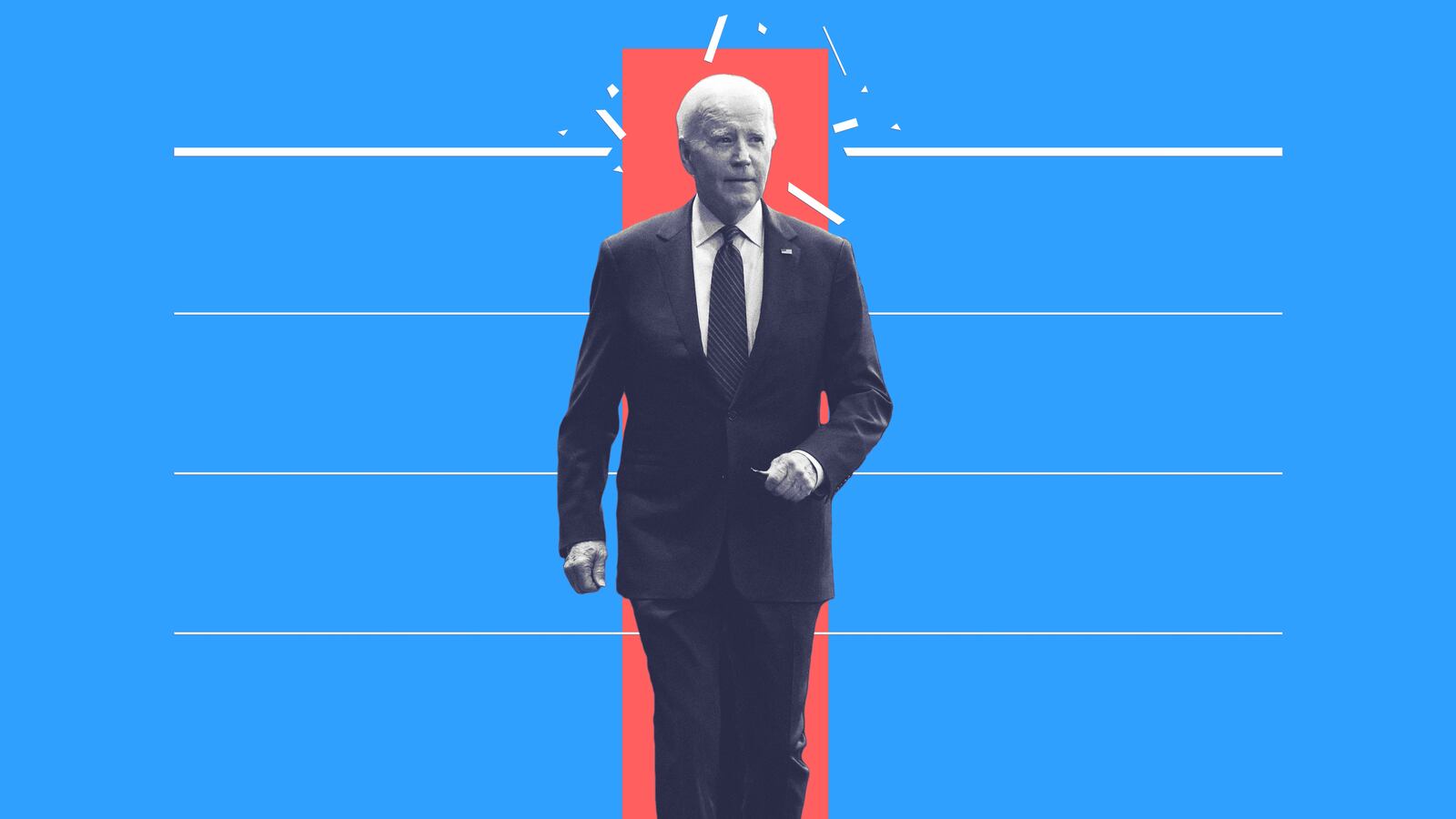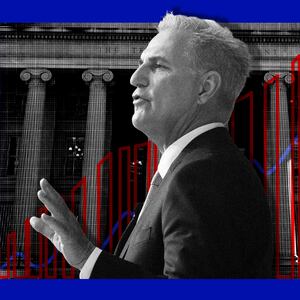With just days to go until a catastrophic default on U.S. debt, Republicans are openly bragging that in exchange for accepting massive spending cuts, the grand prize for Democrats would merely be getting the hostage back alive.
“We’re not inclined,” Rep. Matt Gaetz (R-FL) told Semafor on Tuesday, “to negotiate with the hostage.”
These days, it’s unclear who or what exactly is the hostage—Democrats say Republicans are holding the economy and a debt limit increase hostage, while Republicans seem to think Democrats themselves may be the hostage—but one thing is clear: Democrats are negotiating over extending the federal government’s borrowing authority.
After months of insisting that the topic was non-negotiable, President Joe Biden and his allies are desperately working out a package of spending cuts in exchange for the government simply paying its bills. For its part, the White House has said they are negotiating over the budget, not over the debt limit—but clearly, neither their Republican counterparts nor Democratic allies are acting like that’s really the case.
Naturally, Democrats are frustrated about that state of affairs, so much so that some lawmakers are pushing Biden to circumvent the GOP and raise the debt limit himself by invoking the 14th Amendment to the Constitution, which says the “validity of public debt” should not be questioned.
“He has an obligation, from my point of view—not an option—an obligation to make sure we don't default,” said Rep. Gerry Connolly (D-VA), who endorsed the idea on Wednesday.
Still, few Democrats are publicly putting blame at Biden’s feet for talking to Speaker Kevin McCarthy (R-CA), even though there’s widespread concern that they were backed into a corner the moment they sat at the table with a party willing to risk a default to get what they want.
When The Daily Beast asked a handful of progressives on Wednesday if Biden or McCarthy was more to blame for Democrats’ negotiating position on the debt ceiling, few wanted to entertain the question.
Rep. Jared Huffman (D-CA) said he wasn’t interested in figuring out the “blame-casting answer” at this point. And Rep. Jim McGovern (D-MA) said he didn’t buy into the premise of the question because “we don’t know how all of this is going to turn out.”
Progressives, at the moment, have little faith that there is any possible deal with Republicans that would raise the debt limit and make budgetary changes that are palatable enough for a critical mass of Democrats and Republicans.
When asked what success might look like for Democrats, Progressive Caucus chair Rep. Pramila Jayapal (D-WA) said Republicans would “agree to raise the debt ceiling, and they don’t cut spending, and they don’t institute work requirements, and they don’t put on bad permitting deals.”
“I mean, you can’t screw people,” Jayapal said. “That’s really what it is.”
But Democrats have little faith that Republicans are interested in any sort of deal they’d accept. McGovern, for his part, said the GOP’s vision of a bill was helping Big Pharma, helping fossil fuel companies, not touching tax cuts for billionaires, not touching defense spending, and then demanding that lawmakers “screw poor people.”

The self-described Democratic position—to not screw poor people—is precisely why they wanted to avoid a debt limit saga. Top lawmakers pushed Biden to not negotiate with Republicans at all over paying the government’s bills, believing that Democrats shouldn’t have to trade spending cuts for Congress to fulfill its most basic responsibility of paying the debts it has already incurred.
But that position is far from the party’s current one, though the White House has insisted otherwise. Biden and Democratic negotiators have been working every day to find a deal with Republicans, knowing that any agreement McCarthy would agree to put on the House floor would include real spending cuts that may still hamper the economy.
While Democrats are acknowledging that, perhaps, mistakes were made on the debt limit drama, they aren’t all that interested in blaming any of their own for the mistakes.
“There might be things we do differently, but the fundamental thing is, it’s Republicans creating chaos,” Jayapal said. “And to me, second-guessing what we do is less important than talking about what the hostage-takers are doing.”
If there’s one mistake Biden made, said Rep. Mark Pocan (D-WI), it was “trusting that the Republicans are going to be like normal Republicans, and they would come to a negotiation table and bring a negotiating position and come and compromise.”
“I don’t really blame him for that,” Pocan said.
It was a “risk” for Biden to go to the table, said Connolly. “But what was the alternative?” he said.
“Not talking at all about the national debt, the debt ceiling and avoiding a cataclysm? I guess you could fault him for assuming he was dealing with honorable people who wanted to find a solution.”
Republicans, of course, see the situation much differently. While Democrats are avoiding casting blame for the debt limit negotiations, Republicans see it in terms of credit, though conservatives were hesitant to hand over much of that credit to Biden or McCarthy.
Rep. Scott Perry (R-PA), chairman of the House Freedom Caucus, said “I guess it could be” to McCarthy’s credit that Democrats were negotiating on the debt ceiling, but “it’s certainly not Joe Biden’s credit.”
“That’s the dumbest thing I’ve ever heard,” he said.

Other Republicans were a little more laudatory of McCarthy, but still unwilling to applaud Biden for coming to the table.
“To his credit, he got a bill up,” Rep. Andy Biggs (R-AZ) said of McCarthy, the man he challenged for the speakership earlier this year. “And I didn’t like the bill, but he got a bill out.”
Biggs was one of four Republicans who voted against the GOP debt limit bill, which the House passed in April without any Democratic support. In retrospect, the House passing that bill—which severely cut social spending programs—was a pivotal moment for Republicans forcing Democrats to the negotiating table. And it’s a major reason Republicans have been able to hold out for a deal.
When House Majority Leader Steve Scalise (R-LA) announced Wednesday night that House members would be heading home for their Memorial Day break the next day, he noted that Republicans had already acted on the debt ceiling and were waiting for action in the Senate. (Democrats in the House chamber booed and chanted for five Republicans to sign on to an effort to pass a clean debt limit increase.)
That GOP legislation never faced a realistic chance of becoming law. It would block student debt relief, institute work requirements on people receiving food assistance, cut veterans’ health benefits, eliminate 81,000 Veterans Affairs jobs, and miraculously seal in an untouchable Pentagon budget.
Biden and Democrats have been very clear that they’d never accept such a deal. Some Republicans have even said they don’t want that legislation to become law. But Democrats are increasingly of the belief that Republicans aren’t actually interested in avoiding a default. Donald Trump himself has made those fears real by explicitly pushing the GOP to embrace default if they don’t get “EVERYTHING” they want in negotiations.
“The spoiler alert here is that many of us believe these guys actually want a default,” Huffman told The Daily Beast. “We know them pretty well, maybe a little better than the White House folks.”
Asked how Democrats could negotiate under those conditions, Huffman said “it’s a great question.”
“There’s no answer to it,” he said. “I would choose not to, but I would look at the various other backstops to avoid a default.”
Democrats have been arguing for a while now that Biden could invoke the 14th Amendment. Some legal scholars argue it would actually be unconstitutional to default on the debt. And at the very least, Biden using his 14th Amendment authority would take a long time for the courts to untangle—potentially long enough for Congress to act anyway.
Yet another potential off-ramp is Biden minting a trillion dollar coin, which would allow the government to purchase $1 trillion of debt from the Federal Reserve, and then at least push off a debt limit breach.
And then of course there’s the discharge petition for a debt limit extension, which would force a “clean” bill to avert default to the floor. Democrats are fond of reminding reporters that it’d just take “five patriots” from the GOP, in the words of No. 2 House Democrat Katherine Clark (D-MA), to sign onto the petition and force a vote.
But there doesn’t seem to be any indication that Republicans are fracturing on the debt limit; they are resolute that Democrats find an agreement suitable to their GOP conference, not that a handful of Republicans find a solution that almost all Democrats will like.
For many Democrats, all of these dynamics seem to point toward a disappointing outcome of this saga, much like the last House GOP-Democratic president showdown in 2011 turned out.
Rep. Jerry Nadler (D-NY) was clear that he believes Republicans are holding the country hostage, but speculated that the White House thinks Biden can “make a deal with McCarthy along reasonable lines that we can accept.”
When asked if he blamed Biden for negotiating, the 16-term Democrat said he didn’t think anybody was to blame, before ultimately blaming McCarthy.
But if Republicans are actually cheering for a default, how can Democrats sit down to negotiate with them?
“You sit down just in case you’re wrong,” Nadler said.









